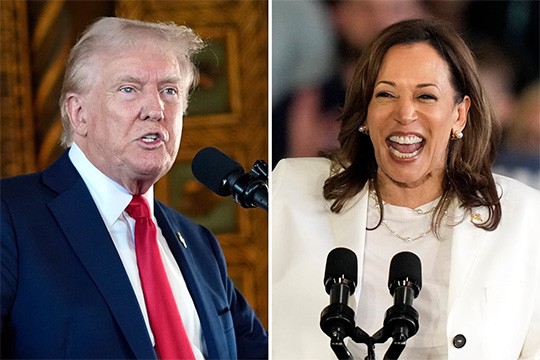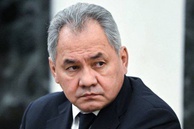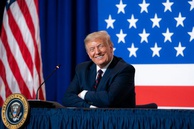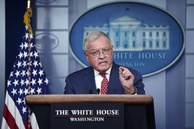The prospect of seeing Donald Trump as president yet again has long been causing serious worries among politicians in Germany. Neither the European Union as a whole, nor Germany proper expect anything good of such a prospect, which they have dubbed “a horrible scenario”. They do remember what a challenge it was to build German-American relations during Trump’s presidency in 2017-21 and how much effort and nerves it cost the then Chancellor Angela Merkel to guarantee German business and foreign policy interests in a dialogue with the overseas “senior”, a fairly unpredictable and wayward ally. As the election date comes nearer, Germans’ worries have been growing and reached their maximum after it became clear that the incumbent President, 81-year-old Democrat Joe Biden, is hopelessly sliding into outsiders as he competes with Republican Donald Trump.
FRG officials saw the situation as a time to act and launched preparations for Trump’s triumph. In fact, preparations to this effect had been going on before but slowly, for which the Cabinet of Chancellor Scholz was harshly criticized by the business elite, the opposition, and the press. The events in the USA following the high-profile failed assassination attempt on the Republican leader at a meeting in Pennsylvania on July 13 made Berlin and Brussels leaders think about what could be done. Trump’s bleeding ear, which earned the boisterous politician a host of sympathetic feelings from the soft-hearted American voters, became a glaring signal: the prospect of facing the unpleasant realities in Washington was as close as never before. Chief Editor of Stern Gregor Schmitz remarked, not without sarcasm, that "the assassination attempt created television images of Trump which he himself could have never ever imagined in his most daring of dreams”.
The Ministry of Foreign Affairs of FRG has set up a special crisis group that is assigned to establish what Trump’s victory would mean for Germany and how Berlin should react. A number of German think tanks have been researching these issues as well. So have the press. German politicians have been probing informal contacts with the Republicans. In an interview on NTV CSU expert on defense Thomas Silberhorn talked about the need to cement ties at all levels, including Trump’s circle: «Not everything is black or white, we need to look into possibilities for action». To this end, the National Congress of the Republican Party in Milwaukee (July 15-18), which officially pronounced Donald Trump and Senator JD Vance as candidates for president and vice-president, was attended by a whole range of German observers, both from the ruling coalition, and from the conservative opposition. On behalf of the federal government of FRG the Congress was visited by Michael Link (Free Democratic Party), coordinator for trans-Atlantic relations in the Ministry of Foreign Affairs. Without going into detail, it is essential to note that the Germans did not walk away from the Milwaukee Congress more enthusiastic than they arrived.
The July arrival in the presidential race of Vice-President Kamala Harris somewhat eased the German worries. The first encouraging reports on her ratings from seven American states which are traditionally associated with the undecided electorate, where she does not only keep abreast with Trump in popularity but in some places runs ahead of him, were welcomed with optimism in Germany, by both politicians and ordinary citizens. Local residents have long understood from the local media, which are incessantly demonizing Trump, that his return to power may yield Europeans a whole bunch of problems. For fairness’ sake we need to say that for Germans the candidacy of Biden sounds equally uninspiring. According to the monthly national representative survey Deutschlandtrend for the First TV Channel ARD, in early July 59 percent of respondents favored neither Biden, nor Trump. By contrast, the survey of Deutschlandtrend of July 8 revealed that with the arrival of Harris the Germans’ expectations of the presidential elections in the USA changed radically. 77 percent of respondents found her a worthy candidate, while only 10 percent supported Trump.
At present, Germany’s media space is inundated with streams of publications about Harris, which analyzes her strong and weak points as a politician, her views on legal and economic issues, but mainly – her experience in international affairs, and her attitude to the EU and NATO, where Trump, in the eyes of Europeans, is largely reminiscent of a bull in a china shop. Against his background, observers say, Harris’ statements on foreign policy issues – on NATO, Israel, HAMAS, Ukraine, European security etc. – sound encouraging, though they acknowledge that she has a long way to go to reach the same level of experience as Joe Biden. This is no wonder – foreign policy has always been Biden’s indisputable prerogative, he has dealt with it throughout his long political career.
Harris has little experience in international affairs, and this is her “weak point”, Tagesspiegel writes. On the other hand, posts on the ARD website recall her most impressive speech on foreign policy this year – at the Munich Conference on Security. Speaking at the conference Kamala Harris “made a clear statement in favor of NATO and international cooperation, apparently in order to demonstrate a difference from Trump”. The same point was underscored by the news portal Web.de. “In her speech in February this year Kamala Harris spoke as Anti-Trump, - the portal recalls. – There are people in the USA, she said, who want to separate from the outside world, ignore the agreements, plan to support the dictators. This, she said, “is dangerous, leads to destabilization, and is short-sighted". In this respect “Harris signaled her commitment to the global leadership of the USA, military support to Ukraine and US-European military union NATO, which Donnal Trump and his allies have pronounced dead”. The press also reminds their readers about Harris’ personal participation in the summit in Switzerland in support of Ukraine. In a word, the German elite’s expectations of the candidate from the Democratic Party are more optimistic. “The presidency of Kamala Harris may have a positive effect for western allies, particularly in conflicts with Russia and China”, - Frankfurter Rundschau says. According to media reports, even though the Congress of the Democratic Party will take place on August 19 through 22, voting at it after the early official approval of the candidacy of Harris will be a mere formality.
However, no matter how inspired the Germans are over the inclusion of Harris in the presidential race, fears over the probable victory of Donald Trump are still there. In the opinion of Berlin, the departure of Biden “changes nothing for now”, - as viewed by trans-Atlantic ties coordinator Michael Link. In his words, irrespective of who wins the November 5 elections, “we, Germany, will continue to closely cooperate with both political camps” in the USA. Though, in an interview with Tagesspiegel he acknowledged that in the case of Trump’s victory Europeans will have to deal with “the opponent who tries to divide even his allies”. The acknowledgment of the top American Republican as “opponent” smacks of “the Freud slip” and despite the declared readiness to cooperate with any winner glaringly reflects the current moods in the FRG political leadership.
So, how ready is Berlin for “the second arrival” of Trump and what does it fear most? The most general answer to this question was presented by the business weekly WirtschaftsWoche after questioning members of the German delegation in Milwaukee: “If the duet of Trump and Vance comes to rule America, Germany and Europe are in for gloomy times”. In any case, the demands on Germany and the whole of the EU are growing. The most glaring contrast for today is the position of Trump, and now Vance, on Ukraine. The former president has made a variety of contrasting statements: from boasting that as president he will stop the war in 24 hours, to promising that he will discontinue any assistance to Ukraine, to pledging to give Kyiv more than ever before. Vance has made it clear that he has practically no interest in what is happening in Ukraine. “Our generosity in Ukraine is coming to an end”, - he wrote for Financial Times in February. Given this, the prospect of remaining the main donor for Ukraine if the USA cuts support is equally worrying for both the Scholz Cabinet and the conservative opposition. The more so given the current large-scale modernization of Bundeswehr, which requires massive expenses.
Trump’s attitude to NATO causes concerns too. His well-remembered statements to this effect with threats to waive ally commitments to protect European countries that allocate insufficient funding for their armies are not perceived as a mere figure of speech by either Berlin or Brussels. A number of German experts believe that if Trump’s words are to be considered seriously, Europe must act “as one player” and should even contemplate having its own “nuclear umbrella”. Considering this, some experts talk about a wider military and economic cooperation of FRG with France, Britain and Poland, with the involvement of other European countries. Others maintain that a scenario under which Donald Trump could deprive Europe of a nuclear shield is far from reality. In the long run, they say, no one wants a new nuclear arms race. Given this, the deployment of American long-range missiles in Germany can be seen as preparations for the second presidential term of Donald Trump. With him in office, such a step would be unlikely. However, Trump could still stop the deployment of Tomahawks – cruise missiles are not to be deployed in Germany until 2026. In general, Berlin believes that foreign and security policies will become much more complicated in the case of Trump’s presidency.
A special issue is the economic consequences for FRG in case of Trump’s victory. Experts of the German Institute of Economics (IW) and the German Foreign Policy Society (DGAP) warn that his protectionist policies under the slogan “Let’s make America great again” will not only cost a lot to the US economy but may inflict a multibillion damage on Germany. As known, during his first presidential term Trump introduced draconian duties on consumer goods (washing machines, solar batteries etc.) and on steel and aluminum products from Europe. His statements still sound the same: all American imports must be subject to penalty duties of at least 10 percent, while imports from China should be liable to 60 percent. Trump wants to reduce the US trade deficit – in 2023 imports exceeded exports by nearly 800 billion dollars. The new data by IW demonstrate that the import tariffs he plans may cost the Federative Republic between 120 and 150 billion euros during his four-year term in office.
With a view to minimize the risk, experts recommend the Scholz government and the EU leadership to use the remaining time of Biden’s presidency for stabilizing trade relations with the USA. For instance, it is important that the EU and the USA sign an agreement on major natural resources, which they are currently negotiating. In addition, the EU should foster its relations with other trade partners by concluding more agreements on free trade, for example, with Australia, MERCOSUR countries, Indonesia, or India. Germany is also concerned over Trump’s readiness for a new trade war with China with the possible involvement of the EU. Meanwhile, German companies stay loyal to the Chinese market. According to the German Foreign Trade Chamber, 54% of companies operating on the market want to boost their investments.
The new development, as compared to the first term of Trump, is the issue of gas. According to IW, Germany is currently importing 13.5% of its gas from the USA. Unlike in the times of cooperation with Russia the high prices for gas are already creating a burden on German companies and households. According to surveys, this is a point of concern. But Trump may introduce export duties as well. If gas from the USA becomes yet costlier, it will mean a further rise in prices for German consumers. The alternative suppliers, such as Qatar, have so far supplied considerably less than the USA. A rise in tariffs will become a serious problem for the German economy.
Many experts call for strengthening the EU as a way to reduce threats associated with Trump’s policies. Together, they say, Europeans are stronger, but this requires coordinated conduct. “Now the chancellor needs a strong leading role”, - Silberhorn says. “We cannot afford to be divided”. But at present, Europeans are unlikely to form a united front against Trump. “Hungarian Prime Minister Viktor Orban will likely rush to embrace Trump, while Chancellor Olaf Scholz and French President Emmanuel Macron will miss President Joe Biden, - the press writes. – Striking a single European chord was never easy”.
The growing understanding of the pile of issues to be faced in the case of Trump’s presidency is forcing the German political elite to yet again critically re-consider the measures which have already been taken by the federative government in preparation for such a scenario. The conclusions could be far from encouraging. In the opinion of Jens Spahn, deputy chief of the parliamentary group of the Christian Democratic Union in Bundestag, the Scholz government is currently poorly prepared for Trump’s new presidency. Nils Schmid of the Social Democratic Party is of the same opinion, calling for more thorough preparations. “Trump does not take Europe and especially EU seriously”, - he warns in an interview with WirtschaftsWoche: During his first term he attempted to divide and weaken the EU. And we must assume that he will continue to do so if he wins the second term”. Indeed, Trump's first term provides the clues as to what should be expected of him. He is no longer as puzzling as in 2016. But whatever the case, it is evident that his re-election would become a trial of endurance not only for trans-Atlantic relations between Washington and the EU, but also for the international positions of Germany proper.
In the meantime, the Germans are looking more and more in the direction of Kamala Harris. She has already come up with fairly pleasant news by appointing Minnesota Governor Tim Walz candidate to vice-president. Tim Walz’ ancestors come from Germany, from Baden-Wurttemberg. According to Badische Neuesten Nachrichten, his great-great-grandfather Sebastian Walz lived in Kuppenheim and emigrated to the USA in 1867. In a word, our guy…., will be easy to talk to…..
The opinion of the author may not coincide with the position of the Editorial
read more in our Telegram-channel https://t.me/The_International_Affairs

 11:19 16.08.2024 •
11:19 16.08.2024 •



























